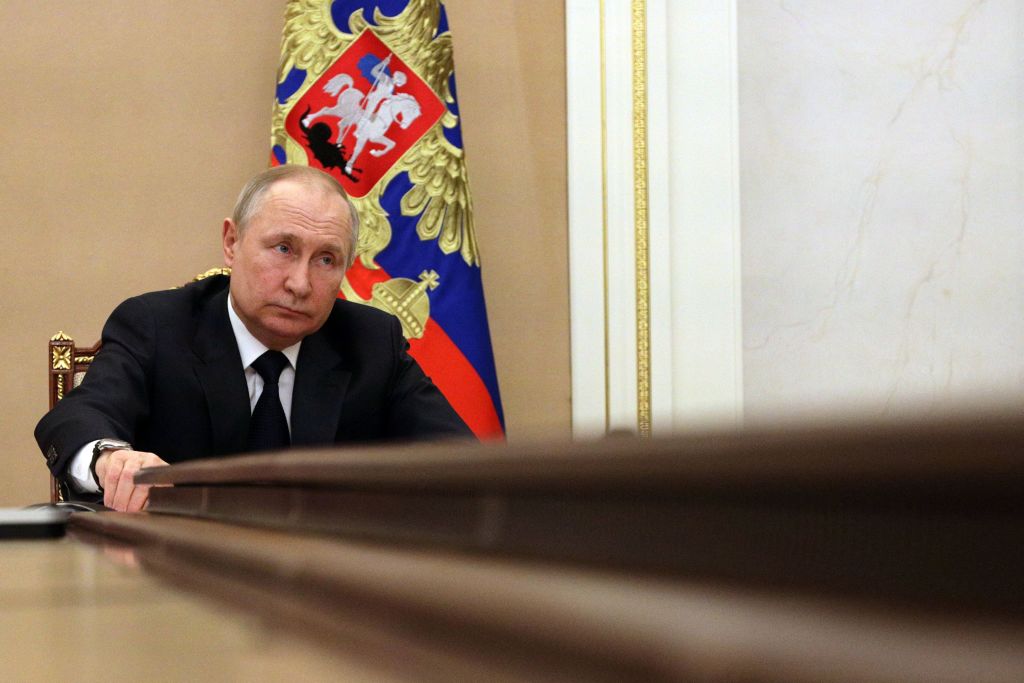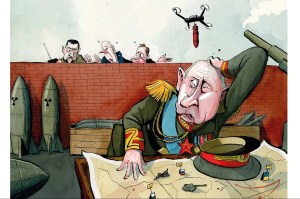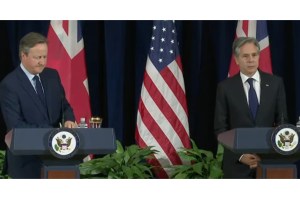Vladimir Putin’s motives in attacking Ukraine have become the subject of many deep and searching speculations. Is he seeking a personal legacy by attempting to reassemble the parts of the Soviet Union that fell asunder? Is he pursuing Russian national security by making sure Ukraine never becomes the frontline of NATO? Is he gleefully taking advantage of a weak and incompetent US president? Is he vindicating the glorious history of the KGB?
These theories are not mutually exclusive, and there are many more possibilities. I want to enter the discussion from my nearly pristine ignorance of Russian geopolitical designs. I bring to the table only my anthropological interest in wayward ideas that somehow prove persuasive to people whose outlook has been shaped by something other than Western culture. Not long ago, I suggested that President Putin might be channeling “an unhallowed tradition that extends back to the Scythians, Timur, the Khazars, the Tatars [and] the Cossacks.” This is not a view likely to be scouted in Foreign Affairs, but I am happy to report that I am not entirely alone in imagining a connection.
Geoffrey Clarfield, a Canadian and fellow anthropologist, brought to my attention an article he published in Canada’s National Post back in 2009 titled “Russia’s New Imperialists.” At the time, Putin was busy with his wars in Georgia, South Ossetia and other southern lands, and Clarfield’s account focuses on the background to these territorial ambitions. But it also seems rather pertinent to what is now happening in Ukraine. Let me tell the story in my own way.
January 2015 saw the birth of an odd entity, the Eurasian Economic Union — the EEU, because one E is never enough. It was formed as an alliance of some of the less prepossessing fragments of the Soviet Union: Armenia, Belarus, Kazakhstan, Kyrgyzstan and Russia, along with several “observer” members: Moldova, Uzbekistan and Cuba.
I don’t recall that the EEU made much of a stir in the American press. But it created an international economic union and free trade zone that included some mineral-rich countries. It has been praised by some observers as founded on a “liberal economic ideology.” But one part of its name — the Eurasian part — is especially resonant. It is more than a convenient name for the midland between Europe and Asia; it is the dreamland of a strange utopian movement called Eurasianism.
Unless you are a specialist in Bolshevik history and the odd permutations that arose later in the twentieth century, you probably have never heard of Eurasianism. It takes a certain anthropological imagination to get the idea. In shortest form, the original Eurasianists theorized that Russia was destined to “evolve” into the greatest world civilization centered on the Russian Orthodox Church. Russian communism would be merely a phase — a ladder that would help Russia gain wealth and power and then be kicked away in favor a glorious new theocracy.
The original promoters of this strange fantasy died out, but their ideas lived on, especially in the hands of Lev Gumilyov, who grew up in Soviet labor camps and later became the founder of “neo-Eurasianism.” Gumilyov was fascinated with the Khazars, a rather mysterious and formerly nomadic Turkic people who assembled an empire in southwestern Asia from around AD 650-850. The decline of Khazaria was connected to the rising power of Byzantium and the conversion of the northern Rus peoples to Eastern Orthodox Christianity.
If you are looking for an origin story of Russia the Great, the Khazars inevitably play a part, and that part is all the more interesting because the Khazars more or less disappeared from history. They have been claimed as the forerunners of all sorts of tribes in the region (Hazaras, Hungarians, the Kazakhs, the Cossacks) and even of the eastern European Jews, and they have inspired some odd literary ventures, such as the Serbian novelist Milorad Pavic’s Dictionary of the Khazars.
Neo-Eurasianist Gumilyov developed fanciful theories of what happened to the Khazars in a way that promoted the reputation of the steppe peoples of the Soviet Union. This didn’t endear him to the Soviet authorities, but towards the end of his life (he died in 1992) Gumilyov gained a cult following, or perhaps something even stronger than that. His messianic revival of Eurasianism held out the hope that the decline of the Soviet Union was just the fulfillment of Eurasianist prophecies, and that a new, more vibrant and powerful nation, with Khazar blood in its veins, was about to be born.
The cult of Gumilyovian Eurasianism is not to be underestimated. He is a historic figure to be reckoned with in central Asia. A monument to him stands in the capital of the Republic of Tatarstan. Kazakhstan hosts the L.N. Gumilyov Eurasian National University.
How seriously should Eurasianism be taken as an ideology? Anthropology has a part to play in answering such questions. Westerners are likely to scoff at Gumilyov’s theories, which are every bit as scoff-worthy as, say, QAnon or antifa. But just because we rate them as absurd doesn’t mean they are without credence in the minds of people who can act on them. The theories of Sayyid Qutb, the American-hating Egyptian leader of the Muslim Brotherhood, look equally absurd, but Qutb’s legacy has been decades of radical Islamic attacks on the West. That’s why it is worth knowing something about the strange ideas that circulate in parts of the world where we typically pay little attention.
I myself have little light to shed on Eurasianism, but once you are alert to the idea, you can catch glimpses of it in many places. Educated (and not so educated) Russians are familiar with the idea. Clearly Putin is familiar with it too, whether as another conceit he can manipulate to his advantage or even perhaps as an inspiring ideal. Clarfield quotes Marlene Laruelle, director of the Institute for European, Russian and Eurasian Studies at George Washington University’s Elliott School of International Affairs, who explains:
The different currents of Russian Neo Eurasianism that emerged in the 1990s all share a set of convictions: an assertion of cultural unity and common historical destiny of the Russians and the non-Russian peoples of Russia, the former Soviet Union or parts of Asia; the idea that the central geographical position of this space in the heart of the Old Continent inevitably entails an imperial form of political organization; a belief in the existence of cultural constants that explain the deeper meaning of contemporary political events; a rhetorical cult of national diversity combined with a dismissal of real autonomy for the minorities; and a rejection of Europe and/or the West and/or capitalism through criticism of “Atlanticist” domination, considered disastrous for the rest of mankind.
This perhaps makes Eurasianism sound relatively sane, but the Gumilyovian foundations are still there. Eurasianism is a theory of the rise and fall of ethnic groups connected to chemical energy from outer space and involving occult influences. To prevail, ethnic groups have to achieve high “passionarity,” which connects to their mating within the group, obeying their elders, sustaining a single religion, and maintaining a fierce allegiance to the state.
Whether this ideology bears on current affairs, I leave to others.


















